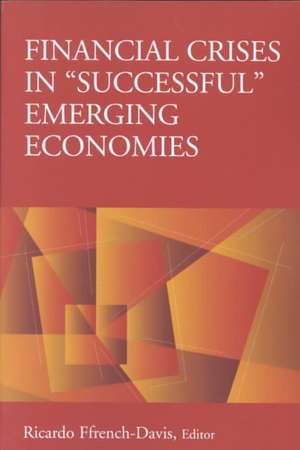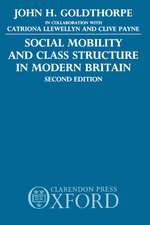Financial Crises in "Successful" Emerging Economies
Editat de Ricardo Ffrench-Davisen Limba Engleză Paperback – oct 2001
Financial crises in emerging economies are very different today than they were in the past. Between 1940 and the 1970s, such traumas involved large fiscal deficits, repressed domestic financial systems, and balance of payments situations that were associated with a sharp worsening of terms of trade. In recent years, however, a "new variety" of crisis has evolved in Asia and Latin America. Many of the emerging economies that have experienced financial trauma have been considered very successful until the crises explode. This collection focuses on such economies. The five contributors provide policy-oriented analysis that seeks to identify crucial variables that affect the probability or intensity of crisis. José Antonio Ocampo (ECLAC) and Ricardo Ffrench-Davis explore the variables that play a part in determining whether a financial crisis is likely to occur. They analyze "vulnerability zones" for certain key variables—such as net liquid external liabilities, current-account deficits, and real exchange rates—and examine how and why capital surges have contributed to worsen marcoeconomic fundamentals in emerging economies. Manuel Agosin (University of Chile) draws a parallel between Korea and Taiwan, showing how the two countries had similar histories between the mid-1960s and the early 1990s, then followed different paths during the 1990s. Ricardo Ffrench-Davis (ECLAC) concentrates on Chile's experience with three "positive" financial shocks: in the 1970s, in 1991-94, and in 1995-97. Jaime Ros (Notre Dame University) explores contrasting situations in Mexico in 1991-94 and 1996-97, and discusses the variables that explain the marked differences between the two episodes. Ricardo Ffrench-Davis is principal regional adviser at ECLAC and co-founder of the Center for Economic Research on Latin America (CIEPLAN). He is the author or editor of fifteen books on international economics, development, strategies, foreign financial, and Latin American economies, including Reforming the Reforms: Macro, Trade, Finance (Palgrave/Macmillan, 1999).
Preț: 224.98 lei
Nou
Puncte Express: 337
Preț estimativ în valută:
43.05€ • 45.06$ • 35.83£
43.05€ • 45.06$ • 35.83£
Carte tipărită la comandă
Livrare economică 31 martie-14 aprilie
Preluare comenzi: 021 569.72.76
Specificații
ISBN-13: 9780815702115
ISBN-10: 0815702116
Pagini: 172
Dimensiuni: 152 x 229 x 14 mm
Greutate: 0.26 kg
Editura: Brookings Institution Press
Colecția Brookings Institution Press
Locul publicării:United States
ISBN-10: 0815702116
Pagini: 172
Dimensiuni: 152 x 229 x 14 mm
Greutate: 0.26 kg
Editura: Brookings Institution Press
Colecția Brookings Institution Press
Locul publicării:United States
Notă biografică
Ricardo Ffrench-Davis is principal regional adviser at ECLAC and cofounder of the Center for Economic Research on Latin America (CIEPLAN). He is the author or editor of fifteen books on international economics and finance, development strategies, and Latin American economies, including Reforming the Reforms: Macroeconomics, Trade, Finance (Palgrave/Macmillan, 2000).
Descriere
A Brookings Institution Press and Economic Commission for Latin America and the Caribbean (ECLAC) publication
Financial crises in emerging economies are very different today than they were in the past. Between 1940 and the 1970s, such traumas involved large fiscal deficits, repressed domestic financial systems, and balance of payments situations that were associated with a sharp worsening of terms of trade.
In recent years, however, a "new variety" of crisis has evolved in Asia and Latin America. Many of the emerging economies that have experienced financial trauma have been considered very successful until the crises explode.
This collection focuses on such economies. The five contributors provide policy-oriented analysis that seeks to identify crucial variables that affect the probability or intensity of crisis.
José Antonio Ocampo (ECLAC) and Ricardo Ffrench-Davis explore the variables that play a part in determining whether a financial crisis is likely to occur. They analyze "vulnerability zones" for certain key variables—such as net liquid external liabilities, current-account deficits, and real exchange rates—and examine how and why capital surges have contributed to worsen marcoeconomic fundamentals in emerging economies.
Manuel Agosin (University of Chile) draws a parallel between Korea and Taiwan, showing how the two countries had similar histories between the mid-1960s and the early 1990s, then followed different paths during the 1990s.
Ricardo Ffrench-Davis (ECLAC) concentrates on Chile's experience with three "positive" financial shocks: in the 1970s, in 1991-94, and in 1995-97.
Jaime Ros (Notre Dame University) explores contrasting situations in Mexico in 1991-94 and 1996-97, and discusses the variables that explain the marked differences between the two episodes.
Ricardo Ffrench-Davis is principal regional adviser at ECLAC and co-founder of the Center for Economic Research on Latin America (CIEPLAN). He is the author or editor of fifteen books on international economics, development, strategies, foreign financial, and Latin American e
Financial crises in emerging economies are very different today than they were in the past. Between 1940 and the 1970s, such traumas involved large fiscal deficits, repressed domestic financial systems, and balance of payments situations that were associated with a sharp worsening of terms of trade.
In recent years, however, a "new variety" of crisis has evolved in Asia and Latin America. Many of the emerging economies that have experienced financial trauma have been considered very successful until the crises explode.
This collection focuses on such economies. The five contributors provide policy-oriented analysis that seeks to identify crucial variables that affect the probability or intensity of crisis.
José Antonio Ocampo (ECLAC) and Ricardo Ffrench-Davis explore the variables that play a part in determining whether a financial crisis is likely to occur. They analyze "vulnerability zones" for certain key variables—such as net liquid external liabilities, current-account deficits, and real exchange rates—and examine how and why capital surges have contributed to worsen marcoeconomic fundamentals in emerging economies.
Manuel Agosin (University of Chile) draws a parallel between Korea and Taiwan, showing how the two countries had similar histories between the mid-1960s and the early 1990s, then followed different paths during the 1990s.
Ricardo Ffrench-Davis (ECLAC) concentrates on Chile's experience with three "positive" financial shocks: in the 1970s, in 1991-94, and in 1995-97.
Jaime Ros (Notre Dame University) explores contrasting situations in Mexico in 1991-94 and 1996-97, and discusses the variables that explain the marked differences between the two episodes.
Ricardo Ffrench-Davis is principal regional adviser at ECLAC and co-founder of the Center for Economic Research on Latin America (CIEPLAN). He is the author or editor of fifteen books on international economics, development, strategies, foreign financial, and Latin American e













